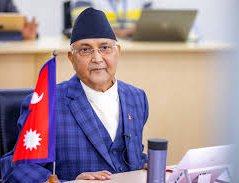
Within an hour of the cabinet approval for Prime Minister KP Sharma Oli's visit to China from December 2 to 5, Foreign Minister Dr. Arzu Rana Deuba flew to China to make final preparations for the high-level visit. This quiet and hurried visit of Foreign Minister Dr. Rana indicates Nepal's dilemma in dealing with China, a close neighbor.
The visit comes ahead of Prime Minister KP Sharma Oli's planned visit to China next week as part of preparations for his trip. Minister Rana is expected to return to Nepal on November 30.
According to sources, Foreign Minister Dr. Rana will convey the message of the Oli-led coalition government and present Nepal's proposal for implementing projects under China's Belt and Road Initiative (BRI) during her meeting with Chinese Foreign Minister Wang in Chengdu.
With the Prime Minister scheduled to visit the northern neighbor on December 2, the BRI is now in the spotlight. Various quarters are keen to see how Nepal will navigate and negotiate the BRI deal with China.
The two ruling coalition partners-the Nepali Congress and the CPN-UML-have been in continuous negotiations to forge a common position of the two ruling parties and finalize Nepal's positions on the assistance to be received from the northern neighbor.
However, there are still dilemmas and differences in both the parties regarding the BRI. The Nepali Congress is completely against any loan agreement under the BRI and the CPN-UML's position is that Nepal should accept the loan as part of other multilateral and bilateral loans from other countries.
Communications and Information Technology Minister Prithvi Subba Gurung said that 39 government officials and 48 representatives from the private sector will be in the delegation led by the Prime Minister.
Among other meetings, Prime Minister Oli is scheduled to hold bilateral talks with Chinese President Xi Jinping and Premier Li Qiang on December 3.
During the visit, discussions are planned on the implementation of previous agreements, cooperation under the Belt and Road Initiative (BRI), and a proposal for grant assistance for Pokhara International Airport, among others. However, the formal agendas of the bilateral discussions have not been made public. Prime Minister Oli will fly to his northern neighbor on Himalaya Airlines.
“Nepali politicians and policymakers at the strategic level should realize Beijing has moved ahead from the traditional way of looking at Nepal. Nepal should assess whether China has shifted the goalpost and its commitments by introducing a non-essential implementation plan as one of its priorities—from a geopolitical perspective—and what it means for the country. Moreover, Kathmandu’s position should be to seek the implementation of past announcements and promises. Lastly, Sino-Nepal relations are of historical importance, and therefore, they cannot be reduced to dividing political forces in Nepal. Nepali politicians need to improvise their foreign policy positioning by understanding that state-to-state relations are becoming more transactional and that each nation will aim to expand its leverage over the other. It is time an aspiring Nepali woke up to the reality of cutthroat competition for influence in international relations,” writes Siddhartha Thapa in the Kathmandu Post.
- TEACHERS ON STRIKE: Students' Future In Jeopardy
- Apr 25, 2025
- NEPAL-THAILAND: Joint Business Council
- Apr 13, 2025
- BIMSTEC SUMMIT: Nepal’s Stand
- Apr 11, 2025
- IME GROUP: Expands Into Paper Industry
- Mar 24, 2025
- CPN UML: Instigated By India
- Mar 23, 2025














